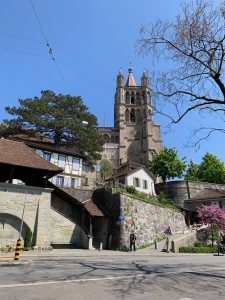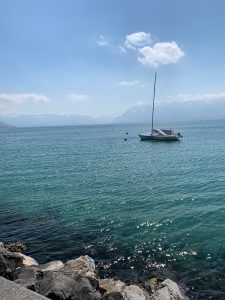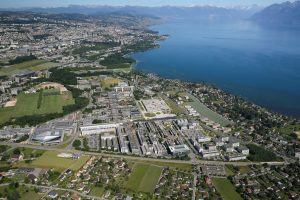Sam Quiring, a UW freshman intending to study electrical & computer engineering, knew in high school that he wanted to study abroad. Hearing only positive experiences from friends and family that did so when they were in college, he wanted the opportunity to study overseas. But as an engineering student with a rigorous academic schedule, he wasn’t sure how he would fit it in. That’s what makes a new engineering study abroad program, sponsored by the College of Engineering and the Department of Electrical & Computer Engineering, offered at École polytechnique fédérale de Lausanne (EPFL) in Switzerland, so appealing.
This new part of the curriculum takes the fundamentals of electrical engineering, an engineering elective available for most engineering students, and offers students an opportunity to study abroad, while staying on track with their engineering degree.
“EPFL is one of the leading research institutions in research institutions in Europe,” said Karl Böhringer, the ECE professor teaching the course in Switzerland. “It is centrally located in the region with superb scientific, cultural and natural resources that will provide an excellent learning environment and a unique experience for our students.”
Böhringer received $5000 of seed funding from the Global Innovation Fund to develop this program.
Mike Engh, assistant director of academic affairs for the College of Engineering, said the program works well because it’s a shorter program, mid-August to early-September, before the fall quarter begins.
“Because we ask a lot of our undergraduate students—a regimented curriculum plus research and internships opportunities and student organizations to help their career prospects—we wanted them to stay on track with their degree while giving them a unique opportunity to study abroad,” Engh said. “This program fits with their curriculum while providing a way for them to see how engineering practice works in a different context, with different historical and cultural influences and usages.”
Students will earn five credits from the program and visit important research facilities such as CERN, the European Organization for Nuclear Research and historical, world-renowned Swiss watch-making companies, and cultural attractions like the International Olympic Committee museum and travel to Zermatt, to see the Matterhorn.
Laurie Willoughby, a second-year mechanical engineering student said she didn’t have many study-abroad opportunities that fit into her engineering curriculum so she was excited to learn about this particular option.
“Without this program, I wouldn’t have studied abroad, but it works perfectly with my schedule,” she said. “I’m excited to study in Switzerland because of its innovative engineering reputation, beautiful scenery and mix of cultures. I also think the small, more intimate class setting will help me understand the material.”
Willoughby said that the opportunity to visit CERN was an added bonus.
Wolf Latsch, the director of UW Study Abroad said studying abroad is not just a memorable college experience, it shows future employees that a student is well-rounded and able to work with and in other cultures. It’s equally important for all students to gain this experience, including students in STEM fields.
“Study abroad opportunities help students break out of how people in the U.S. think about specific research and provides them with the opportunity to see how other cultures address mobile health, grid systems, and other problems that everyone world-wide faces,” said Latsch. “They get to see new challenges and applications outside of their normal training and experience. There are a lot of dilemmas in the world that they will have to help solve, and they can start right now by seeing those for themselves.”
Latsch said that the population of students studying abroad has become more diverse in recent years, but there are major challenges in terms of access to study abroad opportunities especially for underrepresented minorities, students with disabilities, students with financial need – and students in highly structured majors, like many STEM fields. He hopes that by introducing programs like EE 215 that fit well into a student’s curriculum, by helping students through need-based scholarships, such as the ones provided by UW Study Abroad and by improving outreach to departments, more UW students, including engineers, will have the opportunity to study abroad in the future.

Lausanne Cathedral, one of the many sights EE 215 students will see on their study abroad journey. Photo: Mike Engh



